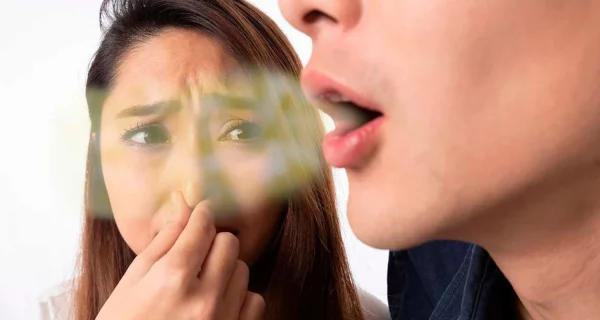Last Updated on: 4th June 2024, 08:10 am
Table of Contents
ToggleCombating Bad Breath on Valentine’s Day
Valentine’s Day is a special occasion; they look forward to sharing romantic moments with their loved ones. However, bad breath can become an unexpected obstacle to intimate approaches. Fortunately, effective strategies will ensure fresh, kissable breath, allowing you to fully enjoy this special day. Below, we explore essential oral hygiene tips, regular dental checkups, and dietary recommendations to help you combat the problem.
Why does Bad Breath occur?

Understanding the causes of bad breath is essential in order to find effective solutions to a common but embarrassing problem. Most bad breath begins in the mouth, where a complex scenario plays out:
- Bacteria and food particles: The bacteria naturally present in the mouth feed on food particles, releasing sulfur compounds that are the main culprits of unpleasant odor.
- Bacterial accumulation: The accumulation of these bacteria, facilitated by food remains, increases the production of malodorous compounds and can lead to more serious infections.
- Dry mouth: A dry mouth environment favors the growth of odor-causing bacteria, since saliva, which normally helps clean the mouth, is reduced.
In addition to factors directly related to oral health, other aspects can influence the appearance of halitosis:
- Gum diseases and dental caries: Underlying problems such as gum disease and tooth decay are direct contributors to bad breath.
- Smoking and tobacco use: These habits are not only detrimental to general health but also cause persistent and unpleasant breath.
- Medical conditions: Certain medical conditions, including respiratory infections, may be underlying factors that contribute to bad breath.
Understanding these causes affords clear insight into why halitosis arises and how our daily routines and health status can influence it. This information is essential to adopt appropriate prevention and treatment strategies, thus improving oral health and confidence.
Regular Dental Checkups

- The importance of prevention: Regular dental checkups are essential to maintaining good oral health and preventing bad breath. These visits allow problems such as cavities or gum disease, which are common causes of bad breath, to be identified and treated in time. A dentist can offer professional cleanings that remove plaque and tartar, difficult to reach with brushing alone.
- How dental checkups prevent bad breath: During a dental checkup, your professional can clean areas that are hard to reach with at-home brushing and flossing, removing plaque and food debris that contribute to bad breath. Additionally, the dentist can offer personalized advice on how to improve daily oral hygiene.
- Tips for visiting the dentist: Before your appointment, prepare a list of questions or concerns related to your oral health. Don’t forget to mention any changes in your medication or general health, as they may influence your breath. Also, ask about specific oral hygiene products recommended for your particular situation.
Proper Oral Hygiene for Fresh Breath
- Effective daily routine: Maintaining a proper oral hygiene routine is essential to combat bad breath. This includes brushing your teeth at least twice a day and flossing daily to remove the food debris and plaque that build up between your teeth and under the gumline.
- Special products: Use antibacterial mouthwashes and xylitol chews, which should help neutralize odors and reduce bacteria that cause halitosis. Changing your toothbrush every three to four months is also crucial to maintaining effective cleaning.
- Effective brushing techniques: Using the correct brushing technique is vital. Brushing should last at least two minutes, covering all surfaces of each tooth. Additionally, it is important to change your toothbrush every three to four months or when the bristles become worn.
- Don’t neglect cleaning your tongue: It’s crucial to remember to clean your tongue every time you brush your teeth, ideally twice a day. We often underestimate the importance of this part of the mouth; however, the tongue is a place prone to accumulating bacteria and germs responsible for bad breath.
To ensure fresh breath, opt for a toothbrush with a tongue cleaner integrated into the back, or use the bristles of your regular brush to effectively clean the tongue.
- The role of dental floss in the fight against bad breath: Flossing is essential to remove plaque and food debris from spaces, where a toothbrush cannot reach. This step should not be overlooked, as food debris left between the teeth can decompose and produce a bad odor.
Diet and Nutritional Tips

- Foods that promote fresh breath: Eating a balanced diet rich in fruits, vegetables, and whole grains can promote fresher breath. Foods such as apples, carrots, and celery act as natural cleansers, while yogurt can reduce levels of hydrogen sulfide in the mouth, a compound associated with bad breath.
- Avoid problem foods: Some foods and drinks, such as garlic, onion, and coffee, can contribute to halitosis. Limiting your consumption, especially on days around important events like Valentine’s Day, can help keep your breath fresh.
Maintaining a Healthy Lifestyle
- Hydration: Drinking plenty of water is essential to keep your mouth moist and reduce bad breath. A dry mouth can contribute to unpleasant breath by allowing bacteria to grow more quickly. It is also possible to help by chewing sugarless gum, as it increases saliva production to avoid a dry mouth. The Oral Health Foundation from the United Kingdom suggests that chewing sugarless gum for 20 minutes after eating can help increase saliva flow.
- Give up smoking: Smoking is not only detrimental to your overall health, but it is also a common cause of bad breath. Seeking help to quit smoking can significantly improve the quality of your breath and your overall health.
Conclusion
Fighting bad breath requires a comprehensive approach that ranges from oral hygiene to lifestyle and medical care. Maintaining a daily oral care routine, such as brushing and flossing – along with regular visits to the dentist – are key steps in preventing halitosis. Likewise, it is important to adopt healthy habits, such as a balanced diet and avoiding tobacco, to combat the underlying causes of bad breath.
Paying attention to the signs of oral health problems and seeking early treatment is critical to maintaining not only fresh breath but also good overall health. In short, understanding the causes and taking proactive measures are essential to defeat bad breath and improve our quality of life.
Bibliography
1. Yetman Daniel, Frank Christine DDS. (Apr, 2021). Why Does Your Breath Smell Bad Even After Brushing?. Healthline. https://www.healthline.com/health/dental-and-oral-health/what-cause-bad-breath-even-after-brushing
2. Ecehverri Daniela, Buffa Vanesa DDS. (Feb, 2024). 10 tips that will help you control bad breath. BetterwithHealth.https://mejorconsalud.as.com/10-tips-te-ayudaran-controlar-mal-aliento/
3. National Institute of Dental and Craniofacial Research NIH. (Oct, 2023). Oral Hygiene.https://www.nidcr.nih.gov/health-info/oral-hygiene
4. Mayo Clinic. (Dec, 2023). Bad breath. https://www.mayoclinic.org/diseases-conditions/bad-breath/diagnosis-treatment/drc-20350925
5. WebMD. (Feb, 2023). Dental Health and Bad Breath. https://www.webmd.com/oral-health/bad-breath



